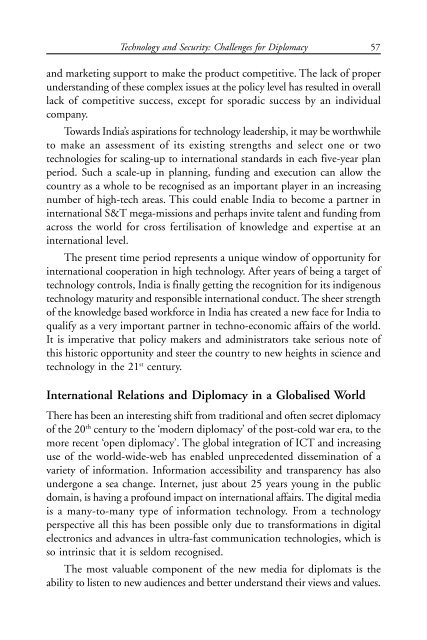ROLE OF TECHNOLOGY INTERNATIONAL AFFAIRS
book_role-of-technology-in-international-affairs_a-mallik_1
book_role-of-technology-in-international-affairs_a-mallik_1
You also want an ePaper? Increase the reach of your titles
YUMPU automatically turns print PDFs into web optimized ePapers that Google loves.
Technology and Security: Challenges for Diplomacy<br />
57<br />
and marketing support to make the product competitive. The lack of proper<br />
understanding of these complex issues at the policy level has resulted in overall<br />
lack of competitive success, except for sporadic success by an individual<br />
company.<br />
Towards India’s aspirations for technology leadership, it may be worthwhile<br />
to make an assessment of its existing strengths and select one or two<br />
technologies for scaling-up to international standards in each five-year plan<br />
period. Such a scale-up in planning, funding and execution can allow the<br />
country as a whole to be recognised as an important player in an increasing<br />
number of high-tech areas. This could enable India to become a partner in<br />
international S&T mega-missions and perhaps invite talent and funding from<br />
across the world for cross fertilisation of knowledge and expertise at an<br />
international level.<br />
The present time period represents a unique window of opportunity for<br />
international cooperation in high technology. After years of being a target of<br />
technology controls, India is finally getting the recognition for its indigenous<br />
technology maturity and responsible international conduct. The sheer strength<br />
of the knowledge based workforce in India has created a new face for India to<br />
qualify as a very important partner in techno-economic affairs of the world.<br />
It is imperative that policy makers and administrators take serious note of<br />
this historic opportunity and steer the country to new heights in science and<br />
technology in the 21 st century.<br />
International Relations and Diplomacy in a Globalised World<br />
There has been an interesting shift from traditional and often secret diplomacy<br />
of the 20 th century to the ‘modern diplomacy’ of the post-cold war era, to the<br />
more recent ‘open diplomacy’. The global integration of ICT and increasing<br />
use of the world-wide-web has enabled unprecedented dissemination of a<br />
variety of information. Information accessibility and transparency has also<br />
undergone a sea change. Internet, just about 25 years young in the public<br />
domain, is having a profound impact on international affairs. The digital media<br />
is a many-to-many type of information technology. From a technology<br />
perspective all this has been possible only due to transformations in digital<br />
electronics and advances in ultra-fast communication technologies, which is<br />
so intrinsic that it is seldom recognised.<br />
The most valuable component of the new media for diplomats is the<br />
ability to listen to new audiences and better understand their views and values.


